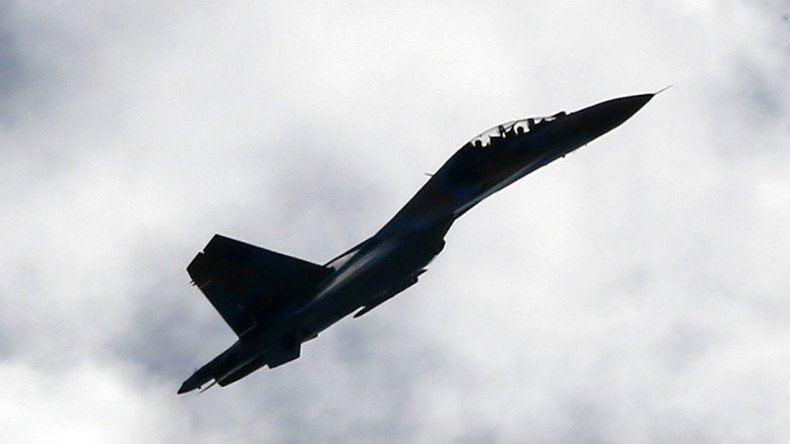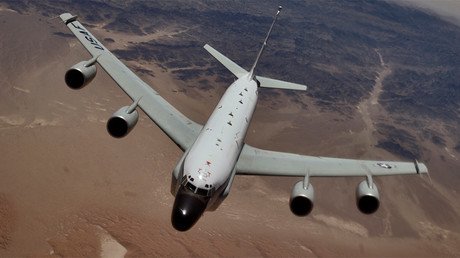Pentagon claims Russian jet fighter barrel rolled within 25 feet of US reconnaissance plane

A Russian fighter jet pulled an “unsafe” stunt within 25 feet of a US surveillance plane Friday, Defense Department officials said. Russian Admiral Vladimir Komoedov, however, denied any potential harm, wondering why the US was there in the first place.
A Russian Sukhoi Su-27 and a US Air Force RC-135 were in international airspace above the Baltic Sea when the former performed a barrel roll over the latter, CNN reported citing Pentagon officials. While initial reports held that the intercept occurred within 100 feet, the US Defense Department updated that to 25 feet.
"This unsafe and unprofessional air intercept has the potential to cause serious harm and injury to all aircrews involved," Lt. Col. Michelle Baldanza, a Pentagon spokeswoman, said in a statement. "More importantly, the unsafe and unprofessional actions of a single pilot have the potential to unnecessarily escalate tensions between countries."
Word for word, that same part of the Pentagon’s statement has been used recently under similar circumstances. Fifteen days prior to this incident, April 14, another Su-27 fighter jet conducted a barrel roll over another US reconnaissance plane, and between April 11 and 12, the USS Donald Cook ship was flown over by Su-24 fighter jets, with the Pentagon releasing footage.
“We’re getting used to the Pentagon’s resentment regarding asserting “unprofessional” maneuvers of our fighter jets intercepting US reconnaissance planes,” Russian Defense Ministry spokesperson Igor Konashenkov said, noting that American RC-135 aircrafts usually sneak to the Russian border with their transponders turned off.
There exist two solutions to avoid being intercepted by Russian jets, “either to stop flying near our borders, or do so with transponder turned on,” Konashenkov said, stressing that a similar RC-135 aircraft flew over Russia today as part of the Open Sky program and “nobody scrambled jets to identify it.”
‘Aggressive simulated attack’: Pentagon decries Russian jets zooming over USS Donald Cook https://t.co/oq2BaTnc1ppic.twitter.com/7TUPqaqG6n
— RT (@RT_com) April 14, 2016
“It was neither a buzz, nor a simulated attack, thus everything is fine. It was not a dangerous maneuver,” the head of the Russian State Duma Defense Committee and former commander of the Russian Black Sea Fleet Admiral Vladimir Komoedov told Interfax, a non-governmental Russian news station. “Why do they even fly here and provoke Russia? I mean, guys, let’s live in peace, do not provoke Russia into actions you would then ventilate in the press.”
After the April 14 incident, US Secretary of State John Kerry said, "We condemn this kind of behavior. It is reckless. It is provocative. It is dangerous."
At the time, Igor Konashenkov said, "The reports of foreign media saying that a Russian Su-27 allegedly flew in dangerously close proximity to a US RC-135 reconnaissance aircraft in the skies over the Baltic Sea on April 14 are not true."
Daniel McAdams, executive director of the Ron Paul Institute for Peace and Prosperity, gave an American perspective different from the official responses to the April 14 event.
"We send naval warships, equipped with the latest equipment, 50 miles from Russian territory in the Baltic Sea, conducting military exercises. The Russians are annoyed and irritated, and we say 'Oh my goodness, how aggressive, how dare you,'" McAdams told Radio Sputnik’s Loud & Clear.
In pursuit of 2017 budget, Pentagon sees danger everywherehttps://t.co/IZ0yGehXS3pic.twitter.com/ZkQdVIEF8G
— RT America (@RT_America) April 28, 2016
A Russian Air Force MiG-31 (NATO code name Foxhound) jet intercepted a US spy plane near Kamchatka in Russia’s Far East on April 21, flying within 15 meters of the aircraft. Washington downplayed the incident, saying it was carried out in a “safe and professional” manner.
Russian fly-by: MiG-31 intercepts US spy plane near Kamchatka https://t.co/m4XKg7WXZUpic.twitter.com/Dc1QgXvUZw
— RT (@RT_com) April 29, 2016













